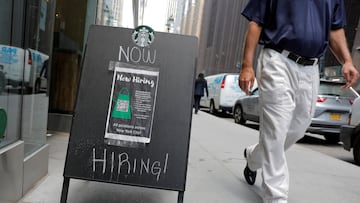What is a rolling recession? Is the US economy in one?
The past few years have been deeply tumultuous for the American economy and different sectors are now experiencing very different economic trends.

It is no exaggeration to say that the US economy is still wrestling with the fallout from the pandemic. After being forced to shut down in early 2020, businesses then received an influx of fresh cash from various support programs which has turbocharged the recovery.
Like the pandemic itself, the economic recovery was felt differently by different sectors and the US economy is now experiencing growing pains as it returns to normal service. Some industries are thriving while others are floundering, a situation that has pushed the US into a rolling recession.
The economy may not fit the definition of a recession, but certain sectors are certainly in contraction. This rolling recession can be much harder to treat because different parts of the economy are growing at very different rates.
What causes a rolling recession?
In economics a recession is a period during which an economy experiences negative growth, whereby the economic output shrinks rather than grows. The name ‘rolling recession’ comes from the way that an economic downturn can ‘roll’ through the economy, hitting different areas at different times.
In recent weeks the clearest example of this in the United States came in the January jobs report, which was released earlier this month. The report exceeded all expectations, adding 517,000 new jobs in January. This was nearly triple the amount that forecasters had predicted.
However these incredible employment figures came at a time when a major sector, the tech industry, announced a raft of layoffs. The likes of Google, Microsoft, eBay and Zoom all announced that they were cutting jobs, despite the nationwide picture appearing positive.
The rolling recession, therefore, is currently taking hold in the technology sector but it will likely move on to other areas of the economy in the coming months.
Which sectors are growing despite the rolling recession?
It would be wrong to suggest that some sectors are ‘benefitting’ from the rolling recession, but certain industries seem remarkably well insulated against the effects. Both technology and the housing market have experienced a sharp decline in the past 12 months, but some industries are performing much more strongly.
In recent months the hospitality sector has been a leader in terms of jobs added and has plenty of room still to grow. The early stages of the pandemic, with stay-at-home orders in place across the country, hospitality was devastated and there is still more growth needed before the industry returns to its pre-pandemic levels.
“This industry [hospitality] is actually still looking to hire a lot of people. It’s the tightest industry in the United States,” said Rand Ghayad, head of economics and global labor markets at LinkedIn.
“There’s a lot of demand. They’re looking for people. There’s a lot of shortages. They can’t find people so these industries, services, industries, accommodation and anything that has to do with food or entertainment are booming.”






